Chengshan Xiao
Asynchronous MIMO-OFDM Massive Unsourced Random Access with Codeword Collisions
May 20, 2024



Abstract:This paper investigates asynchronous MIMO massive unsourced random access in an orthogonal frequency division multiplexing (OFDM) system over frequency-selective fading channels, with the presence of both timing and carrier frequency offsets (TO and CFO) and non-negligible codeword collisions. The proposed coding framework segregates the data into two components, namely, preamble and coding parts, with the former being tree-coded and the latter LDPC-coded. By leveraging the dual sparsity of the equivalent channel across both codeword and delay domains (CD and DD), we develop a message passing-based sparse Bayesian learning algorithm, combined with belief propagation and mean field, to iteratively estimate DD channel responses, TO, and delay profiles. Furthermore, we establish a novel graph-based algorithm to iteratively separate the superimposed channels and compensate for the phase rotations. Additionally, the proposed algorithm is applied to the flat fading scenario to estimate both TO and CFO, where the channel and offset estimation is enhanced by leveraging the geometric characteristics of the signal constellation. Simulations reveal that the proposed algorithm achieves superior performance and substantial complexity reduction in both channel and offset estimation compared to the codebook enlarging-based counterparts, and enhanced data recovery performances compared to state-of-the-art URA schemes.
Weighted Sum-Rate Maximization for Movable Antenna-Enhanced Wireless Networks
Apr 15, 2024


Abstract:This letter investigates the weighted sum rate maximization problem in movable antenna (MA)-enhanced systems. To reduce the computational complexity, we transform it into a more tractable weighted minimum mean square error (WMMSE) problem well-suited for MA. We then adopt the WMMSE algorithm and majorization-minimization algorithm to optimize the beamforming and antenna positions, respectively. Moreover, we propose a planar movement mode, which constrains each MA to a specified area, we obtain a low-complexity closed-form solution. Numerical results demonstrate that the MA-enhanced system outperforms the conventional system. Besides, the computation time for the planar movement mode is reduced by approximately 30\% at a little performance expense.
A Graph-Based Collision Resolution Scheme for Asynchronous Unsourced Random Access
May 23, 2023



Abstract:This paper investigates the multiple-input-multiple-output (MIMO) massive unsourced random access in an asynchronous orthogonal frequency division multiplexing (OFDM) system, with both timing and frequency offsets (TFO) and non-negligible user collisions. The proposed coding framework splits the data into two parts encoded by sparse regression code (SPARC) and low-density parity check (LDPC) code. Multistage orthogonal pilots are transmitted in the first part to reduce collision density. Unlike existing schemes requiring a quantization codebook with a large size for estimating TFO, we establish a \textit{graph-based channel reconstruction and collision resolution (GB-CR$^2$)} algorithm to iteratively reconstruct channels, resolve collisions, and compensate for TFO rotations on the formulated graph jointly among multiple stages. We further propose to leverage the geometric characteristics of signal constellations to correct TFO estimations. Exhaustive simulations demonstrate remarkable performance superiority in channel estimation and data recovery with substantial complexity reduction compared to state-of-the-art schemes.
Joint Device Detection, Channel Estimation, and Data Decoding with Collision Resolution for MIMO Massive Unsourced Random Access
Dec 17, 2021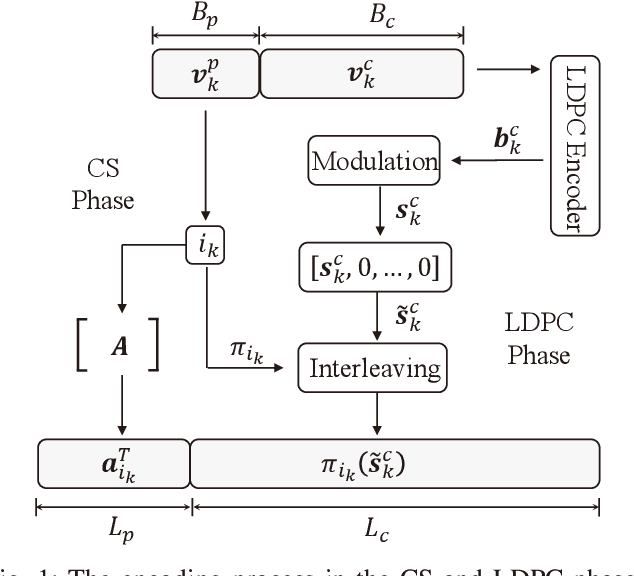
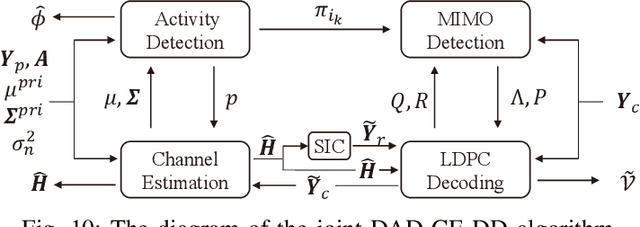
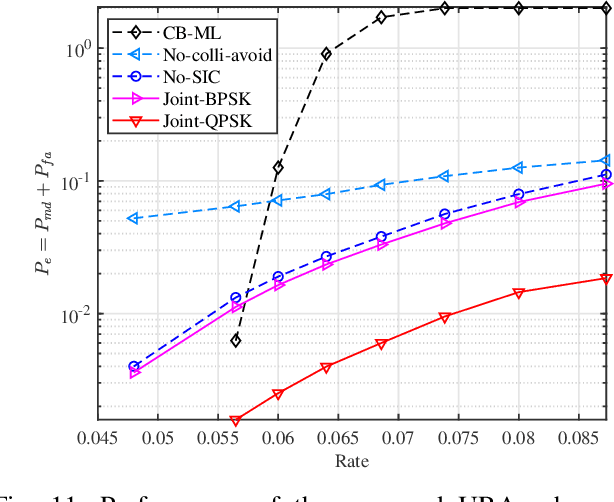

Abstract:In this paper, we investigate a joint device activity detection (DAD), channel estimation (CE), and data decoding (DD) algorithm for multiple-input multiple-output (MIMO) massive unsourced random access (URA). Different from the state-of-the-art slotted transmission scheme, the data in the proposed framework is split into only two parts. A portion of the data is coded by compressed sensing (CS) and the rest is low-density-parity-check (LDPC) coded. In addition to being part of the data, information bits in the CS phase also undertake the task of interleaving pattern design and channel estimation (CE). The principle of interleave-division multiple access (IDMA) is exploited to reduce the interference among devices in the LDPC phase. Based on the belief propagation (BP) algorithm, a low-complexity iterative message passing (MP) algorithm is utilized to decode the data embedded in these two phases separately. Moreover, combined with successive interference cancellation (SIC), the proposed joint DAD-CE-DD algorithm is performed to further improve performance by utilizing the belief of each other. Additionally, based on the energy detection (ED) and sliding window protocol (SWP), we develop a collision resolution protocol to handle the codeword collision, a common issue in the URA system. In addition to the complexity reduction, the proposed algorithm exhibits a substantial performance enhancement compared to the state-of-the-art in terms of efficiency and accuracy.
Optimization Techniques in Reconfigurable Intelligent Surface Aided Networks
Jun 29, 2021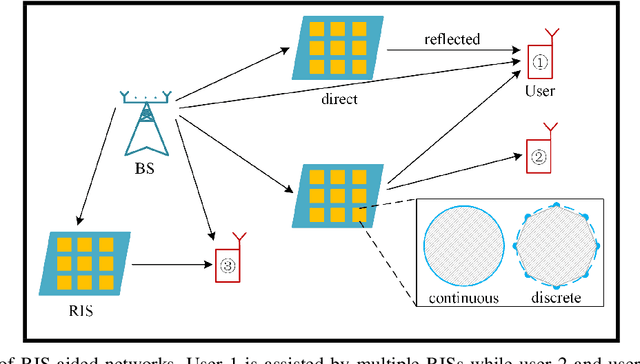
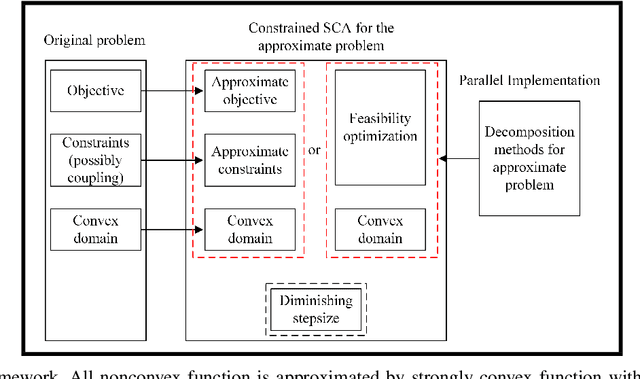
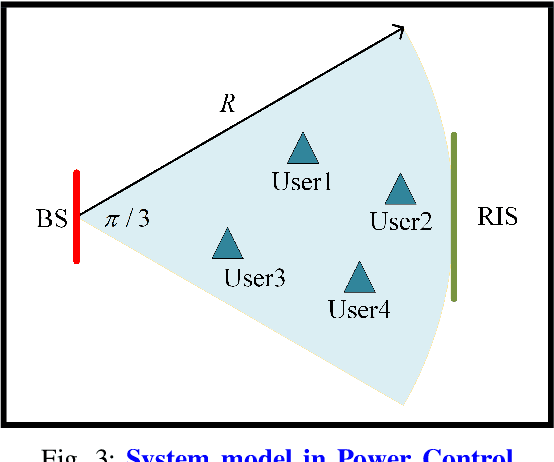
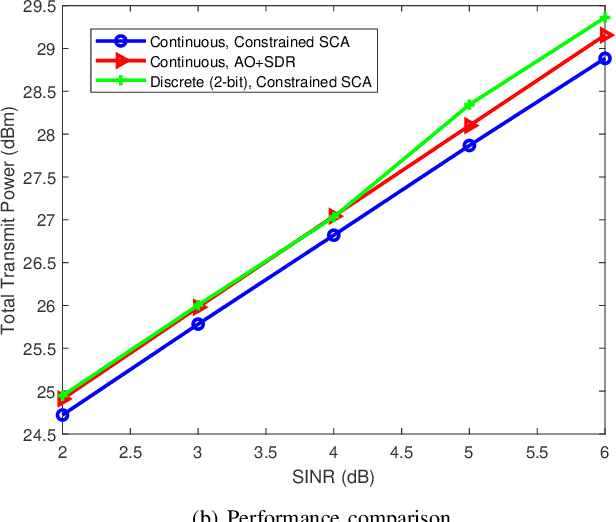
Abstract:Reconfigurable intelligent surface (RIS)-aided networks have been investigated for the purpose of improving the system performance. However, the introduced unit modulus phase shifts and coupling characteristic bring enormous challenges to the optimization in the RIS-aided networks. Many efforts have been made to jointly optimize phase shift vector and other parameters. This article intends to survey the latest research results about the optimization in RIS-aided networks. A taxonomy is devised to categorize the existing literatures based on optimization types, phase shift form, and decoupling methods. Furthermore, in alternating optimization framework, we introduce in detail how to exploit the aforementioned technologies flexibly. It is known that most works could not guarantee a stationary point. To overcome this problem, we propose a unified framework for the optimization problem of RIS-aided networks with continuous phase shifts to find a stationary point. Finally, key challenges are outlined to provide guidelines for the domain researchers and designers to explore more efficient optimization frameworks, and then open issues are discussed.
 Add to Chrome
Add to Chrome Add to Firefox
Add to Firefox Add to Edge
Add to Edge